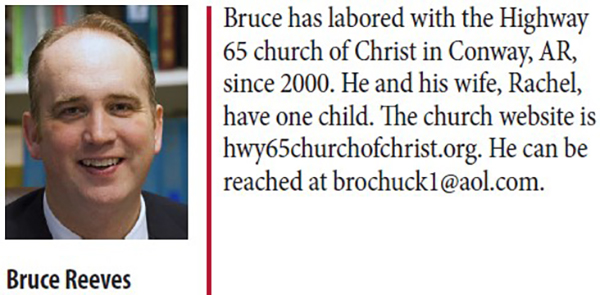by Bruce Reeves
Synopsis: Basic principles of Bible study must not be neglected when examining scriptural teaching on the Holy Spirit. Recognizing the use of figures of speech, context, and harmony can clarify our understanding of this important topic.
The Holy Spirit has revealed the richness of God’s mercy, the sacrifice of Christ’s love, and the power of the Lord’s deliverance. We see His work in creation, the prophets, the incarnation of Christ, the ministry of the apostles, and the early church (Gen. 1:1-2; 1 Pet. 1:10-12; Luke 4:1, 14; Acts 10:38; Rom. 8:11; Mark 16:17-20; 1 Cor. 12: 4-11). For the Christian, the work of the Holy Spirit is both convicting and encouraging.
The Scriptures clearly teach that the Holy Spirit indwells Christians. Yet there are questions we must ask:
“Does the Holy Spirit indwell the Christian separate and apart from God’s word?”
“Does He directly enter into and inhabit the body of the Christian mystically?”
“Should our feelings be used as the criterion by which we determine the will of God and the presence of the Spirit?”
Defining terms is essential in any Bible discussion. The phrase “personal indwelling of the Holy Spirit” can be ambiguous, but what many proponents of this view mean by “personal indwelling” is a divine illumination or direct interaction with our minds separate and apart from God’s word. The idea that the Spirit’s indwelling is constantly producing emotional nudges and intimations exposes brethren to the dangers of emotionalism and subjectivism. Just as the Father and Son relationally dwell in our hearts by faith, so does the Holy Spirit. Not only does He dwell in us, but we also dwell in Him (John 14:10-13, 21, 23; 17:21; Rom. 8:9).
We must recognize biblical figures of speech to draw sound conclusions from our reading of the Scriptures. Metonymy is a figure of speech that links related concepts. For example, “The pen is mightier than the sword” uses metonymy twice. “Pen” references “the written word,” and “the sword” stands for “military aggression.” In Scripture, the Holy Spirit is often mentioned when what He provides or does is actually under discussion. When we read that the apostles received the baptism of the Holy Spirit (Acts 1:5; 2:1-4), what is intended is not that they were immersed in the person of the Holy Spirit, but that they would “receive power” from the Spirit (Acts 1:8; cf. Luke 24:49). Luke describes the Samaritans’ reception of miraculous gifts through the laying on of the apostles’ hands (Acts 8:17) as having “received the Holy Spirit” (Acts 8:15, 17).
Similarly, when Paul speaks of the “Spirit of God dwelling in you” (Rom. 8:9), he is speaking of the Spirit’s teaching and guidance through the word (Rom. 8:2, 14). It is the spiritual mindset that pursues the things of the Spirit in the gospel (Rom. 8:4-8; 1 Cor. 2:9-16). When the apostle argues that those who “are in the flesh cannot please God,” he is not speaking of our physical bodies but our attitude toward spiritual things (Rom. 8:8). We have assurance of our relationship with the Lord through the Spirit’s gospel, and as a result, we have a spirit of adoption rather than fear (Rom. 8:15-16).
Paul uses metonymy in 1 Corinthians 6:19 to discuss the Spirit’s work in sanctification. He declares that our “body” is the “temple of the Holy Spirit” because our body is the visible expression to the world of our whole self (1 Thess. 5:23). This passage is not teaching that the Holy Spirit as a person inhabits our physical body but that our entire being is given to the will of God (see note #1).
We must also avoid a flat (or disjointed) reading of the Bible because it does not take into consideration the immediate and remote context of Scripture, various genres of literature in the Bible, or the comprehensive message of the gospel. It is crucial to consider the “then and there” before the “here and now.” When we are reading the word of God, there are certain questions that we must ask as Bible students:
“Who is the speaker or writer?”
“What is the cultural and biblical context of those who are being addressed?”
“What is the subject that is under consideration?”
This principle comes to light when some attempt to apply Jesus’s promise of inspiration to the apostles to all believers today (John 14:26; 16:7-14). The Scriptures are complete and sufficient to guide us into “all truth” because the promise of Christ to the apostles was fulfilled (Luke 24:46-48; John 16:13; Acts 1:6-8; 2:1-4; Eph. 3:3-5). We must consider the context of various passages rather than conflating verses about the miraculous anointing of the Spirit (2 Cor. 1:21-22; 1 Tim. 4:14; 1 John 2:27) and the Spirit’s influence on the lives of believers through His word (Eph. 5:18).
As we study God’s word, we must identify the focus of a given context. There have been discussions about whether the phrase “the gift of the Holy Spirit” (Acts 2:38) is speaking of the Spirit, Himself, as the gift, or the gift He gives. Even the miraculous outpouring of the Spirit pointed toward salvation in Christ (Acts 2:16-21). The focus of the prophecy is found in Acts 2:21, “And it shall be that everyone who calls on the name of the Lord will be saved,” and Pentecost inaugurated the Holy Spirit’s work in the New Covenant age. Peter goes on to describe Christ’s exaltation as the “promise of the Holy Spirit” (Acts 2:33), which speaks of the promise the Spirit made, not the Holy Spirit, Himself (Dan. 7:13-14; cf. Ps. 16:10-11; 2 Sam. 7:12-13).
Peter’s answer to the question, “What shall we do?” was regarding salvation (Acts 2:36-38, 41, 47). Another consideration is the parallel phrases found in Acts 2:38 and 3:19—“repent” (2:38; 3:19), “be baptized” (2:38) and “be converted” (3:19), “for the forgiveness of sins” (2:38) and “that your sins may be blotted out” (3:19). Now notice that the phrases, “so that the times of refreshing may come from the presence of the Lord” and “the gift of the Holy Spirit,” speak of the New Covenant blessings every believer would receive in salvation (Acts 2:39-40, 47; cf. 2:21; Rom. 10:12-13; Eph. 2:13) (see note #2). We also see the Lord’s provisions in phrases such as “the gift of God” (John 4:10) or “the gift of Christ” (Eph. 4:7). The forgiveness of sins is the means of bringing the refreshment of redemption in Christ.
The “law of harmony” suggests that any given verse must harmonize with the rest of Scripture. This principle helps us understand the indwelling passages in the New Testament. Paul writes, “In Him you also trusted, after you heard the word of truth, the gospel of your salvation; in whom also, having believed, you were sealed with the Holy Spirit of promise, who is the guarantee of our inheritance until the redemption of the purchased possession, to the praise of His glory” (Eph. 1:13-14). The term “sealed” suggests that we are marked with the impression of the Holy Spirit’s character when we obey the message of truth (Eph. 1:13). The Spirit identifies us as authentic children of God and assures us of our future hope through His promises (2 Cor. 5:5; 2 Tim. 2:19; Eph. 4:20).
When my mother worked at First Security Bank in Conway, Arkansas, she would notarize documents as authentic by an authoritative stamp. The Holy Spirit has “sealed,” “assured,” and “confirmed” God’s people through His revelation, not subjective feelings (1 Thess. 2:13).
The Holy Spirit strengthens us in our inner person through the “word of His grace” (Eph. 3:16-17; Acts 20:32; cf. Eph. 4:11-16). In the same context, Paul teaches that Christ dwells in our hearts by faith, and we know that “faith comes by hearing and hearing by the word of God” (Rom. 10:17; Eph. 6:17). The very language of God, Christ, or the Holy Spirit dwelling in us indicates relationship and fellowship (2 Cor. 13:14).
Ephesians 5:17-18 and Colossians 3:16-17 should be studied as companion passages. Interestingly, while Paul commands the Ephesians to “be filled with the Spirit,” he commands the Colossians to “let the word of Christ dwell in you richly” (Col. 3:16). Is he saying that the Spirit and the word of God work separately from one another? I do not believe so. In Ephesians, Paul identifies our submission to the Spirit, while in Colossians, he explains how we submit to the Spirit: “Let the word of Christ dwell in you richly.” The Holy Spirit is not the word, but He influences us through His word. We are commanded to be “filled with the Spirit” by “letting His word dwell in us richly” (Eph. 5:18; Col. 3:16; 2 Thess. 2:13-14).
The Spirit’s word is “living,” “active,” and “powerful” to transform our lives (Heb. 4:12). When brethren begin to say, “You mean all I have is the word,” we need to be extremely cautious because we are on the precipice of error. We have seen such departures over and over, but it can happen again and again. Let us never minimize the sufficiency and power of the Holy Spirit’s word in Scripture, but rather see the true spiritual enlightenment that floods our soul through His message of truth!
Note #1: Although 1 Corinthians 6:19-20 speaks of our individual lives, 1 Corinthians 3:16 speaks of the community of God’s people serving as a temple of the Holy Spirit. Paul’s point is that whether we consider our individual lives or our role in the community of believers, we are to devote ourselves to the worship, service, and sacrifice of our Father, His Son Jesus, and the Holy Spirit.
Note #2: Paul’s use of the phrase “the promise of the Spirit through faith” in Galatians 3:14 is not speaking of the Holy Spirit Himself but of the Holy Spirit’s promise of salvation given to Abraham and fulfilled in Christ. Luke uses “the promise” to refer to salvation as well (Acts 2:39).


